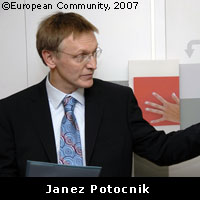Make 'knowledge' a fifth Community freedom, says Potocnik at Green Paper launch
EU Science and Research Commissioner Janez Potocnik prepared the way for a debate on the concept and future direction of the European Research Area (ERA) as he launched a Green Paper on 4 April. The exercise is not an attempt to reinvent the concept, to create a single, centralised European research policy, or to move away from the Lisbon goals tied in with making Europe the world's most competitive economy by 2010, said the Commissioner. Instead, the Green Paper, entitled 'The European Research Area: New Perspectives', outlines what is needed to introduce a 'fifth freedom' within the EU - that of the 'movement of knowledge'. This would complement the four freedoms enshrined in the Treaty, protecting the free movement of goods, services, capital and labour. The current fragmentation is unacceptable and is hindering Europe's development, said Mr Potocnik. The concept of the ERA was first mooted in the year 2000 by Mr Potocnik's predecessor, Philippe Busquin. According to the current Commissioner, the concept of the ERA encompasses three inter-related characteristics: an 'internal market' for research, in which researchers, technology and knowledge can circulate freely; the effective European-level coordination of national and regional research activities, programmes and policies; and initiatives implemented and funded at European level. But in order to meet expectations, the ERA must comprise a further six features: - an adequate flow of competent researchers with high levels of mobility between institutions, disciplines, sectors and countries; - world-class research infrastructures, accessible to all; - excellent research institutions engaged in public-private cooperation, involved in clusters and virtual communities, and attracting human and financial resources; - effective knowledge-sharing, between the public and private sectors, and with the public at large; - well-coordinated research programmes and priorities; - the opening of the ERA to the world, with special emphasis on neighbouring countries. The paper poses questions on each of these six features. The questions ask the scientific community both for new suggestions on how current conditions could be improved, and for feedback on a number of fledgling ideas. 'I want to see how far we can go,' said the Commissioner, briefly mentioning just two new ideas on which he would like feedback: a European social security system for researchers, and enabling countries associated to the EU's research framework programmes to get involved in ERA activities outside of the framework programmes. Other ideas touched upon by the Green Paper include: a European legal framework for new forms of research infrastructure of pan-European interest; common principles for the management of, and access to, infrastructures of European interest; a global forum on research infrastructures; a regulatory initiative to facilitate the creation of public-private partnerships; and European Community membership of intergovernmental research organisations. Mr Potocnik assured his audience that he does not wish to establish a new initiative for every question posed by the paper, but simply to create the right environment for the ERA to flourish. To those who believe that the EU already has its fair share of initiatives aimed at strengthening European research, the Commissioner said that they all address different problems from different angles. 'Together they should complete the puzzle,' he said. The consultation will end in August 2007, and concrete proposals will then be put forward in early 2008. Researcher mobility is clearly a priority throughout the Green Paper, but it is perhaps questionable as to whether the individual EU Member States share this priority - only four countries have now transposed the EU law on scientific visas into national law, while a further two are in the process of doing so. The decision allowing researchers from third countries to work in the Union was agreed by the Justice and Home Affairs Council in the summer of 2004, and the deadline for introducing the law at Member State level is October 2007. 'If the country's authorities are smart, it should be a priority, as obviously their citizens will benefit,' Mr Potocnik told CORDIS News. He added that researcher mobility is of course linked to mobility in general, and that some countries still have problems opening up their markets. 'That's the reality of the situation in which we live,' said the Commissioner.



